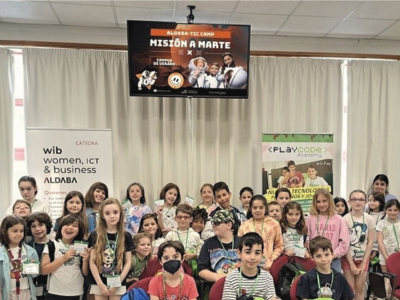This Monday, the Aldaba-TIC Camp summer camp kicked off simultaneously at the School of Computer Engineering on the Ourense campus and the Faculty of Computer Science on the A Coruña campus. The camp aims to promote STEM careers and contribute to gender equality in this field. In each city, 36 children aged 6 to 12 are participating in this initiative, 80% of whom are girls.
The activity, funded for both campuses by the Social Council of the University of A Coruña, is part of the program of the Aldaba WIB Chair: Women, ICT & Business, launched in 2019 by the universities of Vigo and A Coruña and the company Aldaba with the aim of enhancing and enriching the progress of ICT by promoting the growing participation of women in its development and establishing two-way channels of collaboration between academia and business.



A mission to Mars
The Aldaba-TIC Camp will run until Friday 30th from 9am to 2pm at the Faculty of Computer Science of the UDC and in the Polytechnic Building of the Ourense Campus of the University of Vigo. It is taught by instructors from PlayCodeAcademy and will feature the participation of researchers Patricia Concheiro and Carmen Miranda (UDC) and Lorena Otero and María Encarnación González (UVigo). The camp workshops, which play with the idea of preparing a mission to travel to Mars, will be adapted for different ages, but the proposed activities include training reconnaissance drones, programming interaction applications and robots, and building a rocket and 3D tools. To achieve this, the children will use tools such as Lego, Arduino, Scratch, 3D printers, and robotics kits.
The ultimate goal of this activity is to awaken and develop participants' interest in technology and encourage them to see it as something attractive and accessible, as well as to demonstrate its usefulness. ICT careers, and especially computer engineering, remind us from the Aldaba WIB Chair, have a very low female presence that has only decreased in recent years: while female computer science students made up approximately 35% of the total in the 1990s, they are now below 20%. This implies, they emphasize, a loss of talent and that the technology of the future could be biased due to the lack of women's vision in its construction. In this context, the Aldaba-TIC camp also takes into account that "many studies determine that boys and girls have a similar interest in technology and mathematics until approximately 6-8 years of age. From this point on, girls begin to lose interest and feel less capable in mathematics and technology (even though academic results in the field are the same for boys and girls)."



